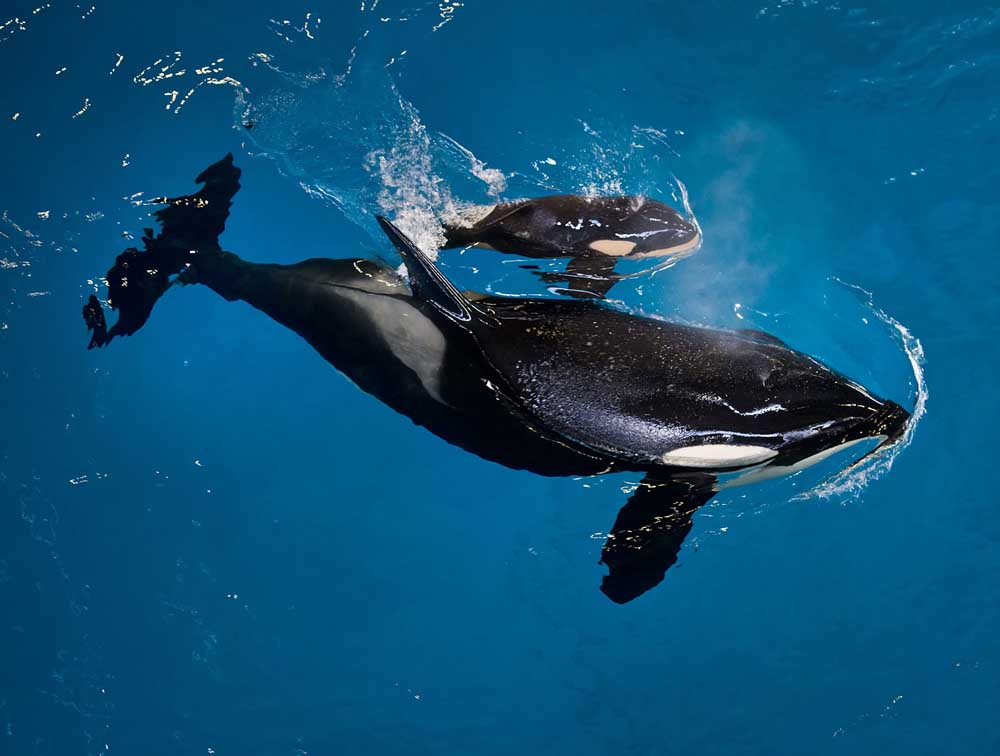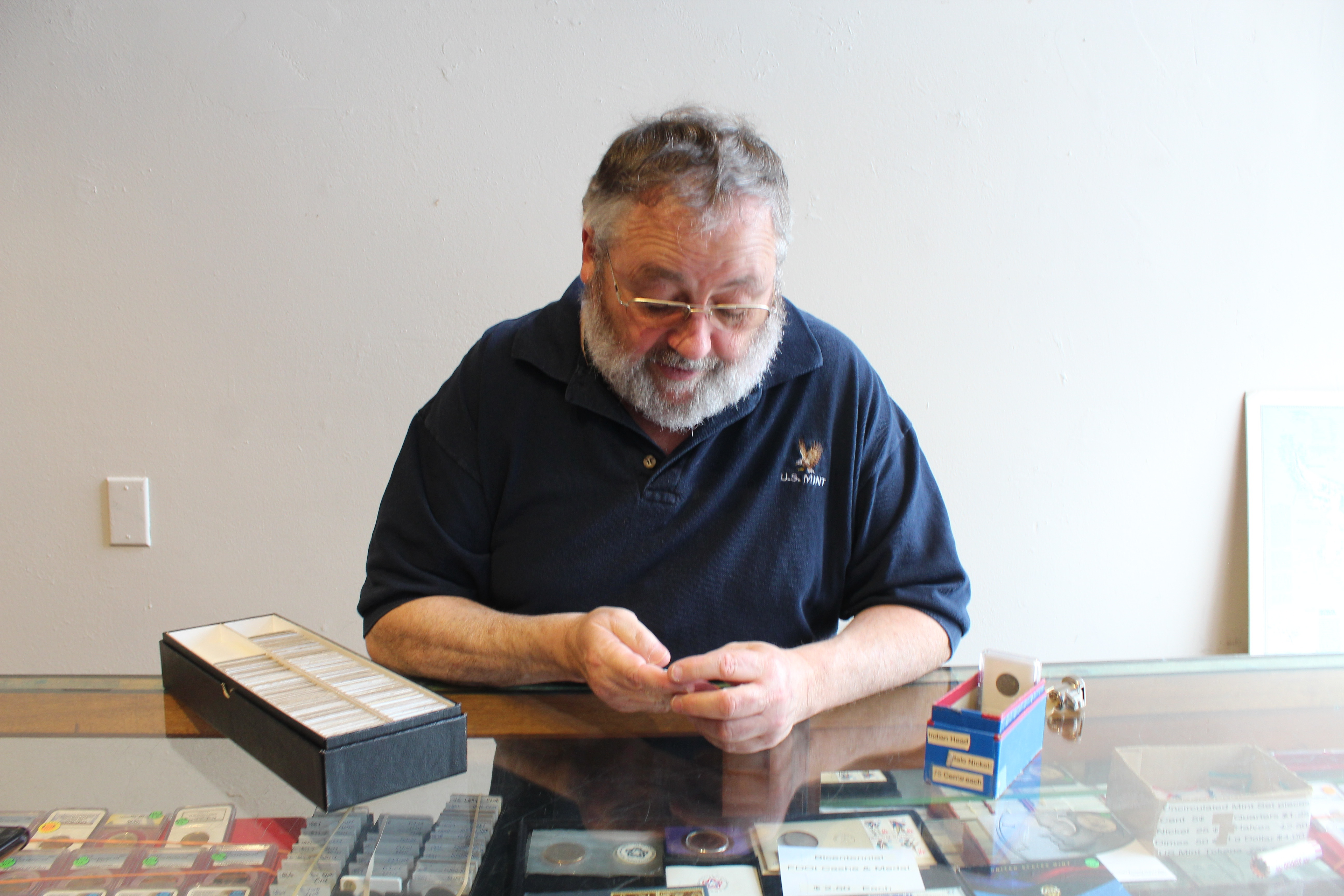World in Brief
Published 6:12 am Thursday, April 20, 2017

- Orca Takara helps guide her newborn to the water's surface at SeaWorld San Antonio, Wednesday in San Antonio.
SALEM — State park officials opened 1,000 additional campsites for people coming to watch the summer solar eclipse from Oregon.
Trending
And it didn’t long for them to fill.
Parks Department spokesman Chris Havel says the campsites were made available for reservation at 8 a.m. Wednesday and it took just over an hour for them to be snapped up.
All state park sites available by reservation are now taken, though cancellations may return a few sites to the pool.
Trending
The highly anticipated eclipse will occur on the morning of Aug. 21.
MIAMI — The last orca has been born in captivity at a SeaWorld park in San Antonio just over a year after the theme park decided to stop breeding orcas following animal rights protests and declining ticket sales.
The Orlando-based company said the orca — the last in a generation of whales bred in confinement — was born Wednesday afternoon. SeaWorld did not immediately name the calf because the park’s veterinarians had not yet determined whether it was male or female.
The mother, 25-year-old Takara, was already pregnant when SeaWorld announced in March 2016 that it had stopped breeding its orcas. The gestation period for orcas is about 18 months.
SeaWorld decided to stop breeding orcas, and phase out its world-famous killer whale performances by 2019, after public opinion turned against keeping orcas, dolphins and other animals in captivity for entertainment. The backlash intensified after the 2013 release of “Blackfish,” a documentary critical of SeaWorld’s orca care. It focused on the orca Tilikum, which killed trainer Dawn Brancheau in Orlando in 2010, dragging her into the pool before shocked visitors after a “Dine with Shamu” show.
Tilikum, which sired 14 calves over nearly 25 years in Orlando, died of bacterial pneumonia in January.
WASHINGTON — The “America First” president who vowed to extricate America from onerous overseas commitments appears to be warming up to the view that when it comes to global agreements, a deal’s a deal.
From NAFTA to the Iran nuclear agreement to the Paris climate accord, President Donald Trump’s campaign rhetoric is colliding with the reality of governing. Despite repeated pledges to rip up, renegotiate or otherwise alter them, the U.S. has yet to withdraw from any of these economic, environmental or national security deals, as Trump’s past criticism turns to tacit embrace of several key elements of U.S. foreign policy.
The administration says it is reviewing these accords and could still pull out of them. A day after certifying Iran’s compliance with the nuclear deal, Secretary of State Rex Tillerson attacked the accord and listed examples of Iran’s bad behavior. His tone suggested that even if Iran is fulfilling the letter of its nuclear commitments, the deal remains on unsure footing.
Yet with one exception — an Asia-Pacific trade deal that already had stalled in Congress — Trump’s administration quietly has laid the groundwork to honor the international architecture of deals it has inherited. It’s a sharp shift from the days when Trump was declaring the end of a global-minded America that negotiates away its interests and subsidizes foreigners’ security and prosperity.
Trump had called the Iran deal the “worst” ever, and claimed climate change was a hoax. But in place of action, the Trump administration is only reviewing these agreements, as it is doing with much of American foreign policy.
LOS ANGELES — Despite the inglorious end to Bill O’Reilly’s two-decade Fox News Channel career, observers say his deep imprint on Fox and other cable news outlets and his influence on barbed political discourse are intact for the foreseeable future.
Fired on Wednesday amid a drumbeat of sexual harassment allegations, the vacationing host’s “The O’Reilly Factor” was quickly redubbed “The Factor” and Fox News announced his time slot will be filled by Tucker Carlson, another adamantly conservative Fox host who dovetails with the channel’s audience.
But it was O’Reilly who created the template for how to succeed in cable TV punditry, delighting his viewers with unapologetic attacks on liberal politicians and media members that he delivered with gusto.
“In many ways, he led Fox’s cable news revolution,” said Frank Sesno, a journalism professor at George Washington University and former CNN Washington bureau chief. “Cable news is someone standing on a mountain top shouting, and Bill O’Reilly was on the highest peak so he echoed across the landscape.”
And he keeps echoing in the broader media landscape. O’Reilly’s success at appealing to like-minded viewers made him and Fox into cable news leaders.
BOSTON — Aaron Hernandez’s death in prison — just days after the former NFL star was cleared of additional murder charges — remains shrouded in mystery.
Why now? Is there more to the story? What happens to his estate?
Authorities offered few answers after Hernandez was found hanging from a bedsheet Wednesday in his cell in a maximum-security prison in Massachusetts, where he was serving a life sentence for the 2013 slaying of a onetime friend.
His death came hours before his former New England Patriots teammates visited the White House to celebrate their Super Bowl victory. Hernandez, 27, died five days after a jury acquitted him in the 2012 shooting deaths of two men whom prosecutors alleged he gunned down after one accidentally spilled a drink on him at a Boston nightclub.
The apparent suicide left friends, family and his legal team shocked and in disbelief. Many were searching for an explanation to the tragic end of a young man whose football skills at one point earned him a five-year, $40 million contract extension with the NFL’s top franchise.
WASHINGTON — Dow Chemical is pushing the Trump administration to scrap the findings of federal scientists who point to a family of widely used pesticides as harmful to about 1,800 critically threatened or endangered species.
Lawyers representing Dow, whose CEO also heads a White House manufacturing working group, and two other makers of organophosphates sent letters last week to the heads of three Cabinet agencies. The companies asked them “to set aside” the results of government studies the companies contend are fundamentally flawed.
The letters, dated April 13, were obtained by The Associated Press.
Dow Chemical chairman and CEO Andrew Liveris is a close adviser to President Donald Trump. The company wrote a $1 million check to help underwrite Trump’s inaugural festivities.
Over the last four years, government scientists have compiled an official record running more than 10,000 pages showing the three pesticides under review — chlorpyrifos, diazinon and malathion — pose a risk to nearly every endangered species they studied. Regulators at the three federal agencies, which share responsibilities for enforcing the Endangered Species Act, are close to issuing findings expected to result in new limits on how and where the highly toxic pesticides can be used.
JAKARTA, Indonesia — U.S. Vice President Mike Pence praised Indonesia’s democracy and moderate form of Islam today alongside the president of the world’s most populous Muslim nation, reinforcing his message with a visit to the region’s largest mosque.
Pence’s comments, though routine, had significance for Indonesian President Joko “Jokowi” Widodo, who a day earlier suffered a serious political setback when a political ally was defeated by Islamic conservatives in the election for Jakarta governor. The divisive campaign undermined the image of Indonesia abroad as a generally tolerant Muslim nation.
Indonesia is the latest stop on an Asian tour by Pence that aims to reaffirm traditional U.S. alliances at a time when Donald Trump’s presidency has raised questions about the strength of the U.S. commitment to the region.
Pence said at a joint news conference with Jokowi that the U.S. wants to strengthen its strategic partnership with Indonesia. In brief comments, Jokowi said they agreed to boost cooperation.
The vice president praised Indonesia for its moderate form of Islam and said the two countries would continue to cooperate on combating terrorism.
BEIJING — China’s foreign minister recently likened the U.S. and North Korea to two speeding trains hurtling toward each other, an analogy that would seem to place China in the role of helpless bystander. And indeed, while tensions have risen, Beijing has been frustrated by its declining influence over the Korean Peninsula.
China “has a grandstand seat but no control,” said University of Virginia China scholar Brantly Womack.
The U.S. is piling the pressure on Beijing to use its clout with North Korea to rein in its nuclear and missile programs. China is the North’s most important trading partner and ally, but Pyongyang has ignored Beijing’s calls for a suspension of those programs and its requests for high-level bilateral talks. China’s relations with South Korea, meanwhile, have plummeted over Beijing’s vociferous objections to the deployment of a sophisticated anti-missile shield.
“China’s approach to the peninsula is under the same strains that it’s been under before. The difference is that, this time, the Americans appear to be applying more overt, real pressure,” said Dean Cheng, senior research fellow at the Heritage Foundation in Washington, D.C.
A slew of recent missile launches and North Korea’s expected test of a sixth nuclear device have heightened concerns that the country is drawing closer to being capable of striking the U.S. with a nuclear weapon — something sure to bring the crisis to a head.
GAZIANTEP, Turkey — He was barely 20 when Islamic State group militants stormed his home city of Deir el-Zour in oil-rich eastern Syria. Mohammed had already been fighting government forces the past two years, so it was an easy decision for him: join the militants to keep up the battle against President Bashar Assad’s rule.
Though he insists he was never a full-on member, Mohammed set about gaining the militants’ trust. He memorized more of the Quran and learned by heart Shariah laws governing jihad, or holy war. He perfected the “IS look,” letting his beard go bushy, wearing pants that stop above the ankle, and removing embroidery from his baggy shirt to show more austerity. He even carried a book of prayers in his pocket.
He did whatever was necessary to keep fighting for Deir el-Zour. But when the militants ordered him last summer to fight elsewhere, he broke ranks, escaping to Turkey.
Mohammed’s journey tells a story from a generation of Syrians who came of age in the midst of war. Teenagers when the civil war erupted in 2011, some had to choose who and what to fight for. At first, the Islamic State group was just another armed group fighting a common enemy.
For Mohammed, his cause was his home.
CARACAS, Venezuela — Venezuela’s opposition is looking to keep up pressure on President Nicolas Maduro by taking to the streets again today hours after at least two people were killed and hundreds arrested in the biggest anti-government demonstrations in years.
Tens of thousands of protesters demanding elections and denouncing what they consider increasingly dictatorial government were met by a curtain of tear gas and rubber bullets as they attempted to march to downtown Caracas on Wednesday. Dozens even had to slide down a concrete embankment and into the Guaire River to escape the noxious fumes.
Across the country the clashes were intense. Pro-government militias, some of whose members were armed, were blamed for the two deaths, including that of a teenager in Caracas who was heading to a soccer game with friends. In several cities, protesters described being terrorized by militia members, some of them armed and circling the protesters in motorcycles.
As night fell, a group of youths tore down signs and billboards to build barricades from which they threw Molotov cocktails and rocks at riot police.
The two killings bring to seven the death toll since protests began three weeks ago over the Supreme Court’s decision to strip the opposition-controlled congress of its last remaining powers, a move that was later reversed amid a storm of international criticism.
CHITUNGWIZA, Zimbabwe — Zimbabwean boys as young as 10 hurry every weekend to a boxing ring whose nickname, Wafa Wafa, in the local Shona language suggests that whoever enters will be lucky to come out alive.
No one has died in the ring, let alone suffered serious injury. But the exchanges can be brutal and bleeding is part of the game in this impoverished township 18 miles (30 kilometers) outside the capital, Harare.
In Zimbabwe, where unemployment is rife and many youths are taking to drugs and alcohol, a former boxing champion hopes the pain in the makeshift ring will make for some gains.
“We are teaching them discipline through boxing. They are less prone to do drugs once they are committed to this regime,” said Arigoma Chiponda, a former light heavyweight local champion who now runs a gym and encourages youths to take up boxing, even though the prospects of going professional are slim.
The floor of the ring is muddied from recent rains, the ropes supported by unprotected metal poles. Most boys go into the ring barefoot. They wear anything from old jeans and T-shirts to shorts. One fighter goes into the ring with formal trousers, shirt and shoes, looking like he’s come from a wedding.
PYONGYANG, North Korea — Coca-Cola is possibly the world’s most recognizable brand, an almost inescapable symbol of the global appeal of American-style consumer culture. There are only two countries in the world where Coke doesn’t officially operate, and one of them is North Korea.
But even the North is developing quite a taste for cola — though the iconic red-and-white labeled bottles the cola comes in likely are not exactly the Real Thing and their twist tops need a bit more than the usual caution. They have a tendency to leak or refuse to come off at all.
North Korea and Cuba are the only countries where Coca-Cola Co. has no operations, said communications director Ann Moore. Coke doesn’t do business with either because of sanctions.
That doesn’t stop Coke making its way over the North Korean border, however.
Coke bottled in China and bearing Chinese labels isn’t hard to find in North Korea’s relatively affluent capital, Pyongyang. It is sold in upscale grocery stores that cater to the capital’s elite and a growing number of middle class residents, who are increasingly earning enough hard cash through entrepreneurial side businesses to purchase more than bare necessities.









